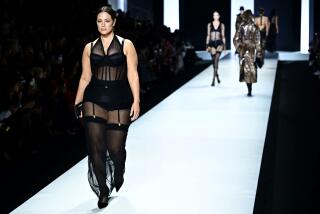The debate over plus-size models in ads and catalogs
- Share via
Do campaigns to alter our attitudes about size and body image have any effect?
Although groundbreaking initiatives, such as Dove’s 2004 Campaign for Real Beauty, have been applauded for their attempts to broaden beauty standards, some experts doubt how successfully they sell products.
At Arizona State University, a marketing scholar in the W.P. Carey School of Business found that ads and catalogs featuring plus-size models are likely to backfire and contribute to low self-esteem that could dampen the enthusiasm to make a purchase.
“We found that overweight consumers feel worse about themselves after looking at any ad with models, because whether they look at thin or heavy models, they are only reminded that they are heavy,” said associate professor Naomi Mandel, who conducted the new study with colleagues at the University of Cologne in Germany and Erasmus University in the Netherlands.
Normal-weight consumers experienced lower self-esteem after exposure to moderately heavy models, such as those in Dove’s campaign, than after exposure to moderately thin models. Mandel said that when normal-weight women viewed the moderately heavy models, they worried that they were similar and overweight.
The response to her findings on blogs and health websites included accusations that the study was anti-feminist, or pro-anorexia, and that it worked against positive attempts to change society’s view of what is desirable.
—Valli Herman





